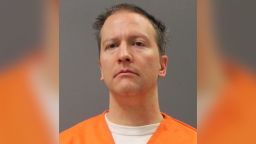The world’s eyes were on Minnesota’s Hennepin County Courthouse as Judge Peter Cahill uttered the word “guilty” three times.
The collective sigh of relief that followed was not America’s alone. The gruesome torture and murder of George Floyd at the hands of the authorities sparked a global reckoning on race.
And for a brief moment, there was the simple answer. Black lives do matter. There will be justice and there will be peace. America had done it.
Leaders around the globe weighed in on US justice in an unprecedented fashion. UK Prime Minister Boris Johnson wrote on Twitter that he was “appalled” by Floyd’s death and welcomed the verdict; his Canadian counterpart Justin Trudeau hailed “accountability” but insisted the fight against “systemic racism” must continue.
But away from the news cameras that fixated for over three weeks on the trial of Derek Chauvin, the brutality of American law enforcement continued to take more Black and brown lives.
A few miles from the Minneapolis courthouse, Daunte Wright was shot and killed by a policewoman shouting “Taser” at a traffic stop. In Chicago, police released bodycam footage showing 13-year-old Adam Toledo being shot and killed with his hands up. And just 30 minutes before the verdict was delivered, a police officer in Columbus, Ohio, fired four shots at 16-year-old Ma’Khia Bryant, killing her, while responding to a fight.
No one was shocked that the bloodletting continued. It was justice for Floyd that had people in tears of disbelief.
But politicians were quick to declare victory and thank a Black man, who begged to live, for dying.
“Thank you, George Floyd, for sacrificing your life for justice,” House Speaker Nancy Pelosi said after the verdict. “For being there to call out to your mom, how heartbreaking was that?”
But the 46-year-old father was not a willing martyr or sacrificial lamb for the Democratic Party’s idea of justice reform. Floyd’s name is known to us only because he was murdered more gruesomely and more publicly than the thousands of victims that came before him.
From the moment the police were called to that now-infamous scene of horror, Floyd was likely to be met with physical aggression.
Between January 2008 and May 25, 2020, 65% of the people who Minneapolis police used force on were Black, according to a CNN analysis. That’s in a city that is just 19% Black.
But the likelihood that Chauvin would face consequences for his actions was extremely slim. Only seven officers in the US have been convicted of murder in a police shooting since 2005, according to a group that tracks data on police crime.
The number of people killed by the police in that same period is not known, because there is no national system of tracking the victims. No measure of the extent of the crisis.
George Floyd could have been one of the nameless and numberless, but his case stood out in every way.
It was a murder exceptional in its brutality. Nine minutes and twenty-nine seconds of horrendous torture under the knee of a cool and casual uniformed White man, until Floyd’s death and even after it.
The amount of evidence was overwhelming – and rarely seen in cases of police brutality. Every second was filmed from multiple angles, several witnesses were at the scene, and in a highly unusual move, the Minneapolis police chief turned on one of his own men and testified against Chauvin.
And the response to it was unprecedented in scope and scale. A mass uprising rocked American cities, and demonstrators from Sydney to London expanded the movement to challenge the global systems of inequality that have bound people of color in Western society for centuries.
As the testimonies in Chauvin’s trial began, the White House was under pressure domestically and internationally to ensure a peaceful outcome that did not once again force capitals around the world to face outpourings of frustration from their own marginalized communities of color.
President Joe Biden watched the trial closely, CNN reported, fearful of how a controversial verdict could undermine America’s stability and security.
His concern was so deep that he cautiously commented on the trial before the verdict was issued, a near break with the constitutional oath that prevents elected officials from interfering with the independence of the judicial branch.
As news came that Chauvin was guilty on all three counts, people gathered at the Cup Foods store in Minneapolis where Floyd was last seen alive, cheering and clapping. A woman kneeled down and pumped her fist in the air as the crowd roared “Justice!”
But activists already fear the next chapter. Many worry this verdict will be used as proof that the American criminal system works because it put Chauvin behind bars.
“We have to always understand that we have to march. We will have to do this for life,” Philonise Floyd, George’s brother, said after Chauvin’s verdict. “We have to protest because it seems like this is a never-ending cycle.”
“I’m not just fighting for George anymore,” he added. “I’m fighting for everyone around the world.”
This verdict will not silence the bellows of pain from communities of color across the globe. That collective sigh was only momentary relief. Black life is still too cheap in America and in the UK and France and in every White Western country with a legacy of colonialism or slavery or oppression.
The institutions of racism have not been eradicated. The brickwork remains at the foundations. One cop convicted of murder will not undo it.




